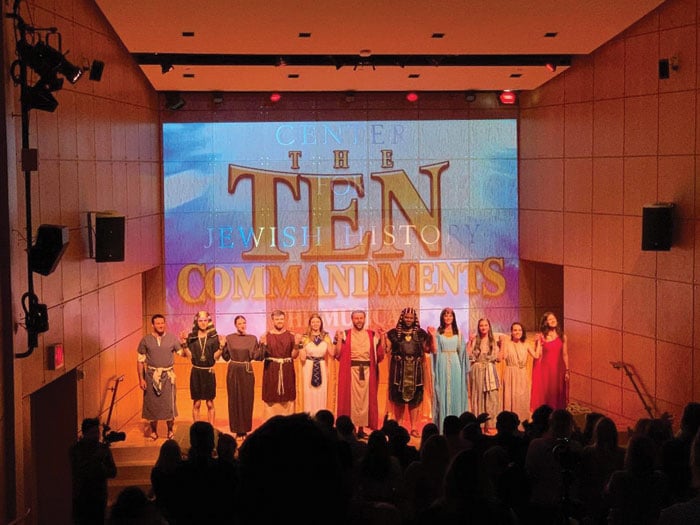
In October 2000, the musical “Les Dix Commandements” opened in Paris and became an instant hit. Within five years, more than three million Europeans saw the spectacular production, created by French filmmaker Élie Chouraqui, known for the film “O Jerusalem,” with music by famed French composer Pascal Obispo and costumes designed by Sonia Rykiel.
One can’t help but wonder how the story of a rescued Hebrew baby who grew up to free his people from 400 years of slavery in Egypt would go over so well in Europe. I was pondering this question as the American adaptation — “The Ten Commandments: The Musical” — was about to premiere in New York City. David Serero, acclaimed opera singer, actor, and director, had fallen in love with the musical when it opened in France. Born in Paris to a Moroccan-Jewish family, Serero decided — why not? — to bring it to the United States, where he would play the lead role.
“Imagine playing a Prophet!” Serero told the Journal. “That doesn’t happen every day.” No it doesn’t, especially one as legendary and complex as Moses. “I’m grateful to Daniel Lévi, the original French Moses, who taught me so much when I went to study the part with him.”
But Serero had a journey of his own ahead of him. It wasn’t just a matter of translation and adaptation to English. “There were no dialogues at all in the original production. I asked Élie Chouraqui to create dialogue to Americanize the show, and I added my own dialogue as well,” says Serero. “It was also essential to make the show work without all the vast sets and decors, as they played the original show in stadiums the equivalent of Madison Square Garden, not in off-Broadway theaters.”
“The Ten Commandments: The Musical” premiered on May 8 at the Center for Jewish History, a little-known jewel that houses the YIVO Institute for Jewish Research and the Yeshiva University Museum, among others. Part of the answer to my question came in the first scene, when Jochebed (Melissa Lubars) gently places her newborn son in a papyrus basket along the Nile River in an attempt to save him, singing “I Choose to Abandon” with Bithia (Lisa Monde).
“Only singing can fully express the emotions of a mother who is forced to abandon her child to the Nile River in order to save him,” says Serero. “We sing what we can’t act and act what we can’t sing.”
And then there was the entrance of the Hebrew slaves. Joshua (Cale Rausch) beautifully sings “The Maximum Pain (La Peine Maximum)”:
But why should we all kneel down?
I want to live standing with pride, with pride.
Since our love is unreachable today,
And our new dream, too high.
To be freed, someday.
But may God forgive,
If just to be only a man —
Well this is, my maximum pain.
What better way to capture the intensity of raw emotion than through music and song? It’s the power of art, especially music, to touch the soul, transcend differences, and inspire the best—empathy, kindness, decency—in each of us.
What better way to capture the intensity of raw emotion than through music and song? It’s the power of art, especially music, to touch the soul, transcend differences, and inspire the best — empathy, kindness, decency —in each of us.
“That was the whole concept of this musical — to ‘humanize’ these biblical characters,” says Serero, a baritone who captured Moses’s complexity brilliantly. The epic 1956 film, “The Ten Commandments,” remains a masterpiece. But I watched the animated musical “The Prince of Egypt” endlessly with my son, and one verse would always stick in my head: “There can be miracles when you believe.” Music resonates.
As the play unfolded, a fuller answer to my question emerged. The story of Exodus presents universal truths: freedom vs. bondage, good vs. evil, dignity vs. subordination. Even though the term “universal truth” is not trendy right now (everything is considered relative or subjective), that doesn’t lessen its own eternal truth.
For Judeans, the story also offers some untrendy truths about idol worship and false gods. Sometimes just one person, inspired by faith, can make others understand the danger of conformity. But we first need to find the strength within. “The Exodus from Egypt occurs in every human being, in every era, in every day,” said Rebbe Nachman of Breslov.
Each of us has a role as well in writing the next chapter of Judean history. For Serero, who recently directed the documentary “The United States of Elie Tahari,” it is taking the musical to theaters across the United States, Israel, Australia, London — and Dubai.
“Chouraqui wanted to illustrate the love of two brothers who are separated only because of differences based on ethnicity and religion.” – David Serero
Indeed, the production has somewhat of a surprise ending. Rather than despise each other, Moses and Ramses focus on their brotherhood. “Chouraqui wanted to illustrate the love of two brothers who are separated only because of differences based on ethnicity and religion,” says Serero.
Perhaps it was Laurie Cumbo, NYC’s new commissioner of the Department of Cultural Affairs, who summed it up best. “I would love for every child in the city of New York to see this,” she told the audience after a performance. “We have to continue to tell stories from history of inspiration, courage, and overcoming adversity. The power each of us has to overcome challenges — to believe in ourselves. To believe in a higher power.”
I have no doubt that everyone who heard her now has a little more faith that the city of New York will overcome its current challenges. The power of art, the power of faith, the power of each of us to believe in ourselves enough to make a positive impact: “One person can alter the universe,” Rebbe Nachman also said.
“This story is 5,000 years old, and yet it’s the most modern one as well,” says Serero. “It promotes a universal message, and anyone in the world can identify with it.”
Karen Lehrman Bloch is editor in chief of White Rose Magazine.






















 More news and opinions than at a Shabbat dinner, right in your inbox.
More news and opinions than at a Shabbat dinner, right in your inbox.